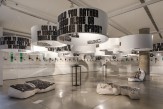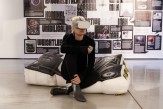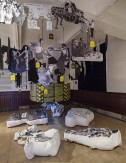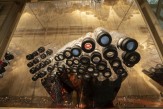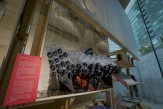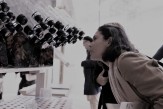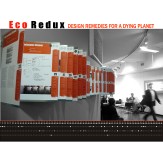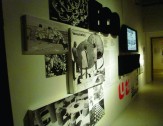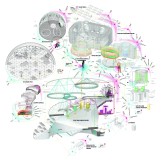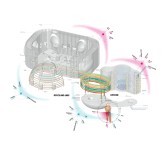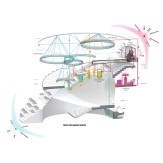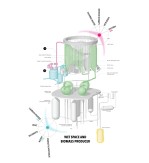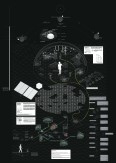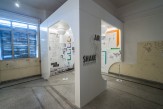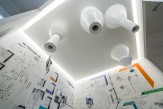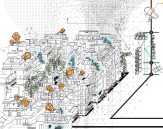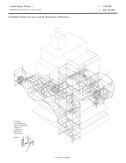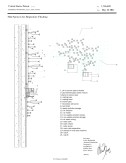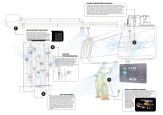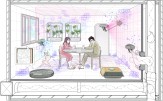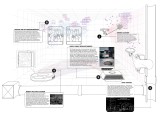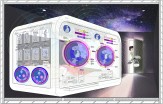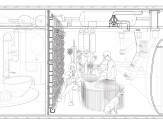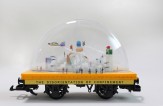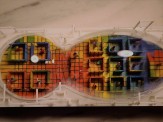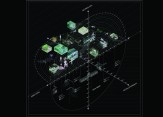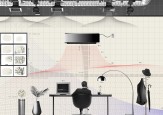Lydia Kallipoliti
Associate Professor
Lydia Kallipoliti is an architect, engineer and scholar. She holds a Diploma in Architecture and Engineering from the Aristotle University of Thessaloniki (Greece), a SMArchS in design and building technology from M.I.T, as well as a Master of Arts and a PhD from Princeton University. Prior to Cooper Union, Kallipoliti was an Assistant Professor at Rensselaer Polytechnic Institute where she directed the MSArch Program, an Assistant Professor at Syracuse University and an Assistant Professor Adjunct at Columbia University [GSAPP] and at the Cooper Union, where she served as a Senior Associate at the Institute for Sustainable Design, and as the Feltman Chair in Lighting. Her research focuses on the intersections of architecture, technology and environmental politics and more particularly on recycling material experiments, theories of waste and reuse, as well as closed and self-reliant systems and urban environments.
Kallipoliti is the author of the online book History of Ecological Design for Oxford English Encyclopedia of Environmental Science (2017), the editor of “EcoRedux”—a special issue of Architectural Design magazine (AD, 2011)—and the author of the book The Architecture of Closed Worlds, Or, What is the Power of Shit (Lars Muller Publishers/Storefront for Art and Architecture, 2018), which was a finalist for the Cornish Family Prize among all publications in design, art and architecture in 2018 by the National Gallery of Victoria in Melbourne. “Closed Worlds” was also an exhibition originally commissioned by the Storefront for Art and Architecture in New York and traveled to WUHO Gallery in Los Angeles and the University of Technology Sydney Art Gallery. It was reviewed by Wired, Dissegno Daily, Abitare, The Observer, VICE, Archinect, The Architect’s Newspaper, and was the recipient of ACSA’s annual award for Creative Achievement in 2017.
Kallipoliti is the recipient of several awards including a silver medal in the W3 international awards for digital innovation in environmental awareness, an honor at the 14th Webby Awards from the International Academy of Digital Arts and Sciences, grants from the Graham Foundation, the New York State Council for the Arts, The Onassis Foundation, an Honorable Mention from the Shenzhen Biennale, the Marvin E. Goody award for the creative use of materials, a Fulbright scholarship, the Lawrence Anderson Award for the creative documentation of architectural history, the Benjamin Menschel Faculty Grant, the Woodrow Wilson Fellowship, the High Meadows Sustainability Fund and design awards from The Architect's Newspaper. Recently, she was recognized as a Leading Innovator in Sustainable Design in BUILD’s 2019, 2020 and 2021 Design & Build Awards.
She is the author of more than fifty articles and research papers published in magazines and books including Log, Architectural Design, Praxis: Journal of Building + Writing, Domus, Volume, ArchPlus, Future Anterior, The Cornell Journal of Architecture, Thresholds, 306090, Pidgin, e-flux architecture, Strelka magazine, TJE, Architecture in Greece, Buildings and Landscapes, The Journal of Architectural Education and several books. Her work has also been exhibited in a number of international venues including the Venice Biennial, the Istanbul Design Biennial, the Shenzhen Biennial, the Onassis Cultural Center, the Oslo Architecture Trienalle, the Royal Academy of British Architects, the National Gallery of Victoria, Melbourne, the Design Hub in Barcelona and the London Design Museum.
Kallipoliti is the Head Curator, along with Areti Markopoulou of the upcoming Tallinn Architecture Biennale with the theme “Edible, Or, The Architecture of Metabolism.”
Websites:
ANAcycle design + writing studio
CLOSED WORLDS research platform
Portrait photo by Carmen Maldonado.
Projects
-
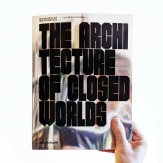
Closed Worlds
-
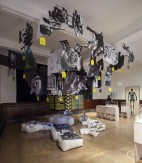
Guinea Pigs
-
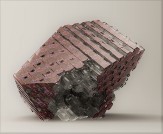
Message in a Bottle
-

EcoRedux
-
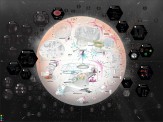
Life on Mars
-
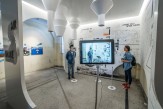
Air Shake
-

Climate House 2020, Or, How to Hack Your Domestic Machines
-

Microclimates
-

Microcosms & Schisms
Back
Closed Worlds
An exhibition at the Storefront for Art and Architecture (New York, 2016), the WUHO Gallery, Woodbury University (Los Angeles, 2019) and the University of Technology Sydney, UTS Art Gallery (Sydney, 2019). Curated by Lydia Kallipoliti; (Virtual Reality by Farzin Lofti-Jam and Amber Bartosh/ Design by Pentagram).
A book by Lydia Kallipoliti, The Architecture of Closed Worlds, Or, What is the Power of Shit (Lars Muller Publishers/ Storefront for Art and Architecture, 2018).
The history of twentieth century architecture, design, and engineering has been strongly linked to the conceptualization and production of closed systems. As partial reconstructions of the world in time and in space, closed systems identify and secure the cycling of materials necessary for the sustenance of life. Contemporary discussions about global warming, recycling, and sustainability have emerged as direct conceptual constructs related to the study and analysis of closed systems.
From the space program to countercultural architectural groups experimenting with autonomous living, CLOSED WORLDS documents a larger disciplinary transformation and the rise of a new environmental consensus in the form of a synthetic naturalism, where the laws of nature and metabolism are displaced from the domain of wilderness to the domain of cities and buildings.
Guinea Pigs
An exhibition installation for the 3rd Istanbul Biennial (2016). Lydia Kallipoliti & Andreas Theodoridis (Holographic Video by Emily Klein).
GUINEA PIGS presented five species of engineered humans: AMPHIBIAN MAN, EXOSKELETAL MAN, EXCREMENT MAN, FEEDBACK MAN and WEIGHTLESS MAN. A series of three-dimensional immersive projections narrated the stories of these figures, as fictional characters offset from the texture of reality; like the living ghosts of archival research. The installation brought together the imaginary of design culture at a given moment in time with the “raw” technical investment of engineering research and development. GUINEA PIGS are not merely speculations of human subjects, but also funded experiments to create superhuman abilities documented in manufactured prototypes, reports and patents. Either drawn or merely reproduced by architects and designers, these figures illustrate that the line between science fiction and social reality is an optical illusion.
Message in a Bottle
An installation for the Oslo Architecture Trienalle (2019). Lydia Kallipoliti, Andreas Theodoridis and Rhett Russo.
Message in a Bottle is an assemblage of interlocking plastic bottles that are intended for water, medical supplies and then used as building elements to create shelter in the event of a natural catastrophe. Each bottle includes a “micro-message” – a story of how to reuse plastic bottles, making evident their effect on the global plastisphere- visible to viewers with the help of optic lens. The installation is designed as an interactive playspace, where bottles can be used as building blocks containing secret messages. The installation fosters a dialogue on topics relating to recycling of industrial products as building materials and on alternative practices where materials exist only in phases and have multiple lives.
EcoRedux
An exhibition at the Design Hub in Barcelona (2011) curated by Lydia Kallipoliti. Earlier iterations at the Byzantine Museum of Greece in Athens and Columbia University in New York.
EcoRedux was an online non-profit educational resource for ecological experiments in the postwar period and their potential creative reuse in contemporary design culture. The project assembled an archival database of an unexplored genealogy of material experimentation conducted by underground architectural groups, as a prehistory of a rising biotechnological imagery crossbreeding throughout different design disciplines. The scope of EcoRedux was to offer a counter-history to the canonic environmental discourse of this period that was centered on the decryption of the planet as a whole ecosystem. The experiments in the archive eschew notions of a planet managed and harnessed as a whole ecosystem. Rather, all imaginable provisional structures and small-scale strategies—pneumatics from used parachutes, handmade domes from discarded materials, electronic-lawn carpets, pills, capsules and self-sufficient systems, garbage houses, foam shelters—were part of new equation in reflection of the intense socio-political concerns of the time and the collective fantasizing about new technologies as remedial tools.
Life on Mars
Lydia Kallipoliti (Architect & Engineer), Project Consultant: Jestin George (Genetic Engineer), Project Team: Beau Avedissian, Ka Hou Cheang, Dorsa Fahandezh, Jialu Huang, Mariam Mesiha, Isabella Wells. This project was supported by the University of Technology Sydney (UTS), School of Architecture and is exhibited at the London Design Museum at the exhibition “Moving to Mars”, 2019.
The colonisation of Mars demands the separation and protection of humans inside a closed life-support system: a self-sustaining physical environment separated from its surroundings by a boundary that does not allow for the transfer of matter or energy. Closed systems enable scarce resources – water and oxygen – to be reused and recycled by being extracted, filtered and recirculated; most importantly, though, they convert waste into new viable commodities. Nevertheless, engineered closed-loop systems, which are mostly portrayed in simulations as robust circular systems, where waste equals food in an endless series of cycles and subcycles, are fragile and vulnerable because they depend on subtle biological interactions and the digestion of resources.
‘Life on Mars’ is an attempt to design the engineering flow chart, used for portraying life support systems almost exclusively using boxes and arrows. Here, the machines that convert waste to viable resources are not “black boxes”- adjunct apparatuses hidden behind living quarters; instead, they are profusely lived in and exhibited as vital spatial elements. The logic of material conversions generates new spatial alliances between a toilet and a garden; a bioreactor and a bathroom; a kitchen and a laboratory; a bed and a virtual reality pleasure dome and other pairings. ‘Life on Mars’ suggests a Martian colony as a digestive inhabitable machine that captures output and converges it to various usable forms; it also proposes an integrated system where humans, their physiology of ingestion and excretion, become combustion devices and biological parts of the system they inhabit.
Air Shake
Lydia Kallipoliti & Andreas Theodoridis with Xueping Li, Erica Vinson, Dakota Pace and Seraphim Le. An installation for the exhibition “Tomorrows” at the Onassis Cultural Center in Athens (2017) and Le Lieu Unique in Nantes (2019).
AIR SHAKE examines the character of air pollutants in future Athens, in order to imagine both an array of future diseases and cures. We document phenomena of leaching caused by a variety of chemicals that have been released into the atmosphere and their scientific, economic, and social attributes. AIR SHAKE projects current urban habits in plausible future scenarios extracted from the present, based on the impact that different mixtures of air impose on human bodily systems. The project imagines an array of diseases that have begun to manifest, with Athens registering the highest levels of atmospheric pollution in decades. As a result of the debt crisis and the citizens’ denial to yield to the overblown energy taxation, the continuous combustion of random cheap available materials, has resulted in the excessive release of particulate matter, sulfur dioxide, carbon monoxide, and other carcinogens, eventually disemboweling the livelihood of citizens and their right breathe in the city. The projection of four speculative diseases onto the urban environment takes form as a series of healing environments, making visible the linkage between the air pollution and the imagined disease.
The AIR SHAKE installation operates around two systems that together create an immersive experience. First, there is a series of chimneys, which present the city upside-down, spewing different shakes of air mixes to heal city dwellers. A secondary system is visualizing the air shakes each chimney spews in a virtual reality environment, accessible through a series of movable tablets installed in the room. The installation space is imagined as a virtual healing environment that allows the physical embodiment of the visitors to project and immerse themselves in a series of future atmospheres.
Climate House 2020, Or, How to Hack Your Domestic Machines
Climate House 2020 is a series of drawings by Lydia Kallipoliti with Youngbin Shin for the exhibition “The Climate Imaginary” opening at the Melbourne Design Week 2021 and hosted by the University of Melbourne and the National Gallery of Victoria.
Climate House 2020 examines smart ventilation systems, growrooms, microbial home kitchens, vertical green walls, hyper-oxygenated and synced sleeping chambers, Roombas, spirulina taps and wastewater treatment systems, in order to critique, ‘hack,’ and dismantle domestic machines as tools of surveillance and environmental control. The scope is not to provide living machines as preventative measures to combat climate change, but rather, to create tools of resistance to reinvent the house -in parts- as a world of metabolism and digestion; a world, unsubscribed to the persistent analytic monitoring of biorhythms and personal data.
In the drawings, we constructed visual and verbal narratives of interiorization, environmental control and assembled a chronicle of the microclimates that construct our contemporary landscape. “Cleaning” addresses the obsession of confinement with details in the home and the propensity to remove dirt at all costs from all surfaces of the house yet dispensing with physical labor. With Roombas and other automated cleaning service robots, the compulsive need to remove dirt services an industry of global surveillance, by collecting personal data across homes all over the world. “Breathing” speaks to pervasive discussions on ventilation and air quality throughout the pandemic, as well as the fear of invisible pathogens, air pollutants and contaminants that we hope to keep at bay with several phytoremediation and purifications devices. “Sleeping” visualizes the scientific management of sleep, evidenced in devices that are commonly used to analyze patterns of health and provide useful feedback. At the same time, this continuous monitoring allows all aspects of life to be quantified, commoditized, and monetized. “Eating and bathing” renders the home as a recirculatory living machine where streams of wastewater can be rerouted to nourish edible hydroponic gardens. It demonstrates the fragility and limitations of food supply chains and the ways in which we may envision alternative microenvironments where food can be produced via recirculating resources.
Climate House 2020 is a critique of the idealization of comfort, the fear of disease, the obsession for biocontrol and the hysteria of containment. For the reality of the inside also generates its own hysteria. Inside, small-scale microbial communities teach us that in all likelihood, our containment will come back to bite us.
Visit the exhibition here.
Microclimates
Microclimates is research work presented in the installation project “Microcosms and Schisms” at the 17th Venice Architecture Biennale. Credits: Lydia Kallipoliti with Xiaoxiao Zhao and Doosung Shin. Consultants: Austin Wade Smith, Pamela Cabrera.
With Microclimates, we aim to situate “living together” as a fragile constitution of micro-ecologies; a fragmented assembly of confined interiorities with varied environmental conditions; an intersection of the technical and psychospatial dimension.
Living 90% of our lives indoors has proliferated as a modality of living and working in New York City since the early 1980s. With the allusion of comfort, the climatically controlled interior reflects the hubris of late-modern capitalism in the heightened combination of entertainment and ecology within the place of work and the domestic interior. The voluntary containment of bodies and psyches inside, exhibits new forms of urbanization and collectives enabled from the economic and societal structures of uninhibited energy expenditure.
Microcosms & Schisms
Microcosms and Schisms is an installation project for the 17th Venice Architecture Biennale by Nora Akawi, Hayley Eber, Lydia Kallipoliti Lauren Kogod and Ife Vanable. The project team consisted of Sally Chen, Yingxiao Chen, Nienying Lin, Jamie Lindsey, Austin McInnis and Doosung Shin. Installation Coordinator: Austin Wade Smith. Installation Drawings: Niki Kourti. Fabrication: Chris Otterbine. The project was supported by the Irwin S. Chanin School of Architecture at The Cooper Union and IDC Foundation.
The question, “how will we live together?” challenges us to consider the slippery and fictive meanings of any unified “we.” We can become a provisional “We” in some contexts and, in so many others, access is denied, the sense of place-and-kin withheld or cancelled, “otherness” established and architecturally embodied. In this sense, we understand the urban as a constellation of simultaneous microcosms; carefully constructed spaces of urban interiority and containment of climates, ecologies, and bodies. This installation presents critical readings of New York interiorities, and the transgressions and breaches that characterize them: the facade and the politics of the envelope, the public park as a space of manufactured wilderness and urban collectivity, spaces of climatic control and environmental inequality, and the city’s sites of sanctuary and transnational solidarity. The collective scope of our project is to examine how spatial contracts are formed and sustained, as well as what forms of living they engender, in New York City.




